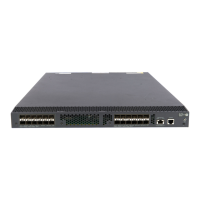<Sysname> system-view
[Sysname] public-key local destroy dsa
Confirm to destroy the key pair? [Y/N] :y
# Destroy the local ECDSA key pair with the default name.
<Sysname> system-view
[Sysname] public-key local destroy ecdsa
Confirm to destroy the key pair? [Y/N]:y
# Destroy the local RSA key pair rsa1.
<Sysname> system-view
[Sysname] public-key local destroy rsa name rsa1
Confirm to destroy the key pair? [Y/N]:y
# Destroy the local DSA key pair dsa1.
<Sysname> system-view
[Sysname] public-key local destroy dsa name dsa1
Confirm to destroy the key pair? [Y/N] :y
# Destroy the local ECDSA key pair ecdsa1.
<Sysname> system-view
[Sysname] public-key local destroy ecdsa name ecdsa1
Confirm to destroy the key pair? [Y/N]:y
Related commands
public-key local create
public-key local export dsa
Use public-key local export dsa to display local DSA host public keys in a specific format, or export the
key in a specific format to a file.
Syntax
public-key local export dsa [ name key-name ] { openssh | ssh2 } [ filename ]
Views
System view
Predefined user roles
network-admin
Parameters
name key-name: Specifies the name of a local DSA key pair. The key-name argument is a case-insensitive
string of 1 to 64 characters, including letters, digits, and hyphens (-). If no name is provided, the
command displays or exports the host public key of the local DSA key pair with the default name.
openssh: Uses the format of OpenSSH.
ssh2: Uses the format of SSH2.0.
filename: Specifies the name of the file for saving the local host public key. The file name is a string of
case-insensitive characters excluding ./ and ../. The name cannot be dots (.), hostkey, serverkey, dsakey,
164

